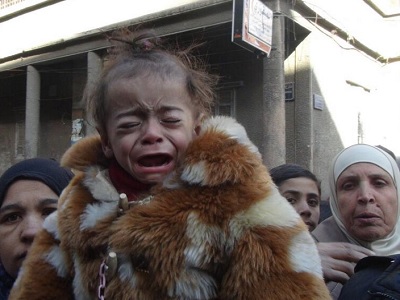
The UN Security Council has demanded access to the camp after IS (formerly known as ISIS) entered and were reported to be executing opposition fighters. The United Nations’ agency for Palestinians (UNRWA) has called for the protection of the estimated 18,000 people still living in the camp, with the organization’s commissioner-general Pierre Krahenbuhl describing the situation as “one of the most severe ever.”
As IRIN’s timeline shows, suffering in the camp is not new – it has been under siege by the Syrian government for around two years, with the residents desperately short on food. The latest events are only likely to worsen an already desperate humanitarian situation.
Yarmouk founded
Formed in 1957 for Palestinians who fled across the border after the creation of Israel in 1948, Yarmouk quickly became home to the largest Palestinian refugee community in Syria. Located 8 kilometers from the center of Damascus, it is 2.1 square kilometers in size. While it is called a camp, the area has become a residential neighborhood. Before the Syrian war started in 2011, there were around 150,000 registered Palestinian refugees living in the area, as well as several hundred thousand Syrians.
March 15, 2011
Syrian uprising begins
In March 2011, the first protests erupted against Syrian President Bashar al-Assad following the downfall of dictators in Tunisia and Egypt. Security forces brutally crushed the peaceful demonstrations against Assad, with hundreds killed and arrested.
June 6, 2011
Upheaval spreads to Yarmouk
In June 2011, more than a dozen Palestinians were killed on the Israeli border after they were encouraged to protest by Syrian authorities and the Popular Front for the Liberation of Palestine General Council (PFLP-GC), which ran Yarmouk. The families of those killed complained that the PFLP-GC had encouraged residents to protest on the Israeli border without support – leading to their deaths. Protesters attacked the headquarters of the PFLP-GC in Yarmouk. 13 were killed by PFLP-GC security forces.
December 16, 2012
Camp ‘liberated’
The Free Syrian Army (FSA) rebel group formed a battalion to liberate Yarmouk from the pro-Assad PFLP-GC. Following days of clashes, government airplanes struck the camp for the first time in December 2012. Despite the bombings, the PFLP-GC were forced to retreat and on December 15 the group’s leader, Ahmed Jibril, fled Damascus, leaving the camp in rebel hands.
July 10, 2013
Under siege
After the Syrian regime lost control of the camp, the intensity of the bombardment increased. Access into Yarmouk had been partially closed off since the beginning of 2013, but on July 10 – two days into Ramadan – pro-Assad forces barred all food and medicine from entering. Residents, including women and children, were prevented from leaving while shelling continued.
December 8, 2013
Desperation worsens
The lengthening siege drove the residents to ever more desperate means. Reports emerged of Palestinians dying due to the lack of basic medical goods, while others were said to be eating cats and dogs to survive.
March 11, 2014
Some aid allowed in
After months of pressure from the United Nations, the siege was lifted to allow some aid in. However the opening was not to last long and by the end of 2014, UNRWA – the UN’s agency for Palestinians – was again unable to deliver humanitarian aid to the camp.
April 3, 2015
ISIS takes the camp
After days of fighting, militants from so-called Islamic State (formerly known as ISIS) entered the camp from the south. The extent of their control remains unclear but the majority of Yarmouk is allegedly in their hands, with reports of at least two captives publicly beheaded. While ISIS has been fighting the Al-Qaeda affiliate Jubhat al-Nusra in much of Syria, in Yarmouk the two appear to be working together.
(IRIN – www.irinnews.org)




